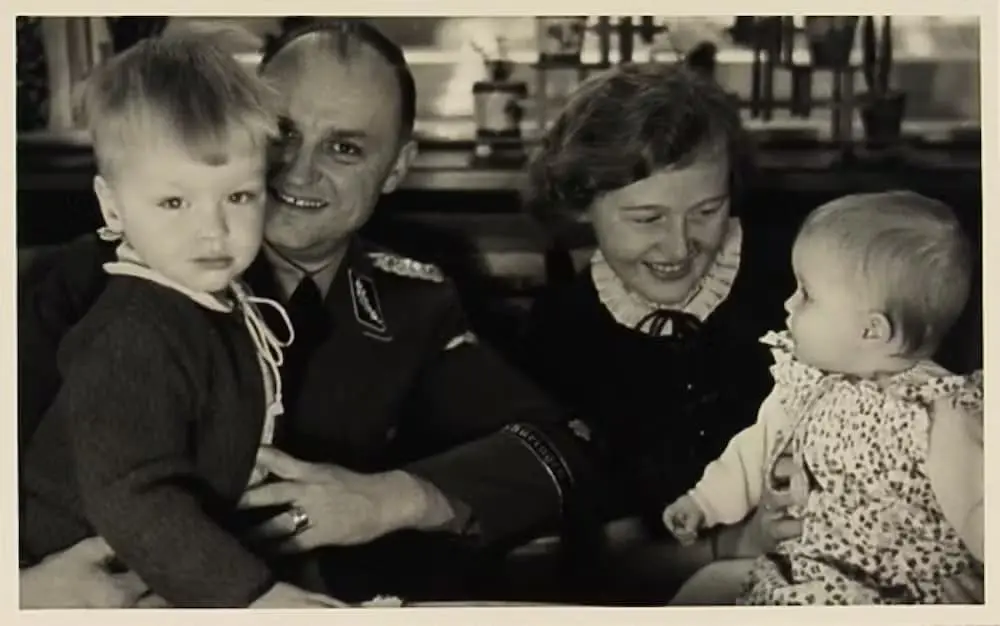
Meet Ilse Koch’s Kids: Uwe Köhler, Gisela Koch, Artvin Koch, and Gudrun Koch
Ilse Koch, born Margarete Ilse Köhler on September 22, 1906, in Dresden, Germany, came from a modest working-class background.
Her parents, Max Köhler, a factory worker or foreman, and Anna Köhler (née Kubisch), raised her in a Protestant household, though little is known about the family’s specific religious practices. Of German (Aryan) ethnicity, Ilse grew up in an environment that would later align closely with Nazi ideology.
Trending Now!!:
She completed elementary and lower secondary schooling before attending trade school, where she trained in secretarial and bookkeeping skills.
Before entering politics, she worked as a stenographer and accountant, positions that reflected her administrative proficiency. In 1932, at the age of 26, she joined the Nazi Party, marking the beginning of her association with one of history’s darkest regimes.
Ilse married Karl-Otto Koch, an SS officer, on May 29, 1937 (though some sources cite 1936). The couple met when she was around 21, and their union produced three children: Artwin Koch (born 1938), Gisela Koch (born 1939), and Gudrun Koch (born 1940), who tragically died in infancy from pneumonia in 1941.
During her postwar imprisonment, Ilse gave birth to a fourth child, Uwe Köhler, in October 1947, believed to be fathered by a fellow inmate.
Ilse Koch became infamously known as the “Bitch of Buchenwald,” a title tied to her brutality and complicity in atrocities at the Buchenwald concentration camp, where her husband served as commandant. Her name remains synonymous with the moral collapse of the Nazi era, a legacy that cast a long shadow over her family.
Following the war, she was convicted for her crimes, imprisoned, and ultimately died by suicide on September 1, 1967, at the age of 60.
The Koch children—Artwin, Gisela, Gudrun, and Uwe—grew up burdened by the infamy of their parents, their lives marked by tragedy, secrecy, and the struggle to distance themselves from their mother’s dark legacy.
Uwe Köhler
Uwe Köhler, Ilse Koch‘s youngest child and only son, born outside her marriage to Karl-Otto Koch, entered the world under the most extraordinary circumstances.
Conceived during Ilse‘s detention at Dachau internment camp—likely with fellow prisoner Fritz Schäffer, though the father’s identity remains unconfirmed—Uwe was born on October 7, 1947, at Landsberg Prison, where his mother was held awaiting trial.
At just seven months pregnant during her sentencing to life imprisonment for war crimes, Ilse was forced to relinquish the newborn immediately after birth. Uwe was placed in foster care in Bavaria, growing up unaware of his origins.
It wasn’t until he was 19, in 1966, that Uwe discovered his mother’s identity by spotting her name on his birth certificate at age eight, but only piecing it together later. Overwhelmed yet determined, he visited Ilse at Aichach women’s prison during Christmas 1966, describing their reunion as joyous.
They met monthly thereafter until her suicide by hanging on September 1, 1967, just weeks before her 61st birthday. In her final note, Ilse addressed it to Uwe, writing, “There is no other way.”
By 1971, at age 23, Uwe—a successful insurance salesman—launched a public campaign for his mother’s posthumous rehabilitation, arguing that her convictions for major crimes lacked solid evidence and that she had been unfairly targeted as a woman in a male-dominated trial.
He approached outlets like The New York Times, insisting the “Bitch of Buchenwald” moniker was propaganda and that Ilse was a victim of wartime hysteria. Despite his efforts, the campaign gained little traction, but Uwe‘s story highlights the profound personal toll of inherited stigma. Little is known of his later life, but his advocacy stands as a poignant attempt to reclaim a mother’s humanity.
Gisela Koch
Gisela Koch, the middle child and surviving daughter of Ilse and Karl-Otto Koch, was born on April 26, 1939, in the opulent villa adjacent to Buchenwald, a stark contrast to the suffering beyond its walls.
As a toddler during the war’s height, Gisela‘s early years were insulated by her parents’ status, but the camp’s grim reality loomed large. Her father was executed by the SS in 1945 for embezzlement and corruption, and her mother’s 1947 conviction shattered the family.
Post-war, Gisela and her siblings faced ostracism and poverty in Allied-occupied Germany. To escape the Koch name’s toxicity, she changed her surname upon adulthood and married, building a quiet life away from public scrutiny.
Unlike her brothers, Gisela outlived the era’s direct traumas, passing away in 2021 at age 82. Details of her career or family remain private, a deliberate choice reflecting the era’s survivors’ desire for anonymity.
Archival photos, including one of a four-year-old Gisela with her mother, offer rare glimpses into her childhood innocence amid horror.
Artvin Koch
Artvin Koch (sometimes spelled Artwin), the eldest child of Ilse and Karl-Otto Koch, was born on June 17, 1938, just months after the family arrived at Buchenwald.
Named possibly after a nod to distant roots, Artvin spent his formative years in the camp’s commandant’s residence, oblivious to the atrocities unfolding nearby. His father’s 1945 execution and mother’s imprisonment thrust the boy into a world of shame and instability, as the Koch name became synonymous with Nazi evil.
As an adult, Artvin married Maria and fathered two children, attempting normalcy in post-war West Germany. Yet, the weight proved unbearable. Learning the full extent of his parents’ crimes—his mother’s conviction for abusing prisoners and her husband’s profiteering from slave labor—Artvin grappled with profound guilt.
On January 1, 1967 (some sources cite 1964), at age 28 or 29, he took his own life, unable to reconcile his identity with familial infamy. His suicide, allegedly driven by the “shame of his parents’ crimes,” remains a tragic emblem of intergenerational trauma.
Artvin‘s brief life and early death highlight how the Holocaust’s echoes reverberated through innocent offspring, denying them peace.
Gudrun Koch
Gudrun Koch, the youngest daughter of Ilse and Karl-Otto Koch, entered a world of fleeting joy and swift sorrow. Born on December 11, 1940, in the Buchenwald villa, she was doted upon by her parents and nanny—Ilse‘s sister Erna—during a brief family idyll.
Tragedy struck mere months later: Gudrun succumbed to pneumonia on February 3, 1941, at just four months old, during a skiing holiday when her parents were away. The infant’s death devastated Ilse, who reportedly blamed wartime conditions and medical neglect, though it was a common fate for babies in that era.
Gudrun‘s loss compounded the family’s unraveling; her father was removed from command soon after amid corruption charges. As the only Koch child to die naturally and young, Gudrun‘s story is one of innocence untouched by later horrors, yet her passing marked an early fracture in the Kochs’ facade of domestic bliss.
Buried quietly, her memory lingers in historical accounts as a footnote to Buchenwald’s darkness—a reminder that even in evil’s heart, personal griefs unfolded. Ilse Koch‘s children embody the human cost of history’s monsters: lives derailed by crimes they did not commit.
From Uwe‘s quest for redemption to Artvin‘s despair, their stories urge reflection on legacy, forgiveness, and the innocent caught in tyranny’s wake.
NOTICE!! NOTICE!! NOTICE!!
At TheCityCeleb, we strive to provide accurate and up-to-date biographies and entertainment news, focusing on celebrities. Our editorial team researches information from reputable sources, including interviews, official statements, and verified media.If you spot an error or have additional details, please contact us at editor@thecityceleb.com. We value your feedback and are committed to maintaining trustworthy content.


